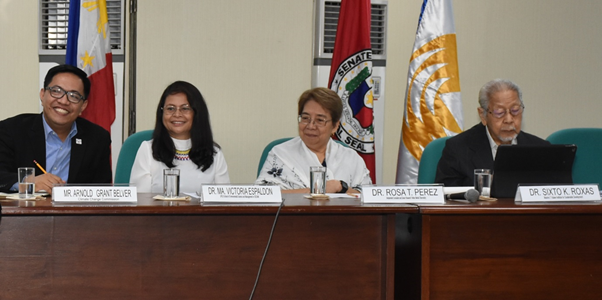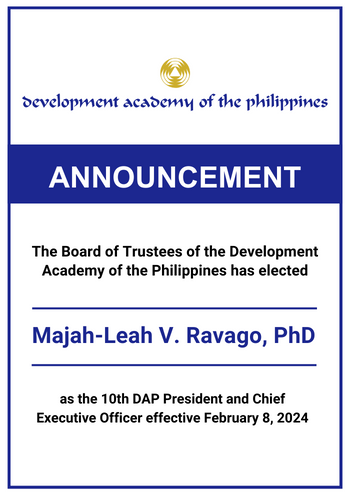
From left to right: Mr. Arnold Grant Belver of the Climate Change Commission, Dr. Ma. Victoria Espaldon of University of the Philippines Los Baños, Dr. Rosa Perez of Manila Observatory and Dr. Sixto K. Roxas of the Development Academy of the Philippines-Council of Fellows and Maximo T. Kalaw Institute for Sustainable Development are shown during the panel discussion on the Ways Forward for the Philippines.
The Development Academy of the Philippines (DAP), through its Center for Governance (CFG), held the third installment of its lecture series for legislative staff titled “Climate Action in the Philippines” last October 3 at the Senate of the Philippines in Pasay City. The lecture was attended by the participants from the emerging and senior leaders track of the Capability Building on Innovative Leadership for Legislative Staff (CBILLS) program. The sessions were delivered by experts and practitioners in the field, namely, Dr. Rosa Perez and Arnold Grant Belver. Likewise, Dr. Sixto Roxas and Dr. Maria Victoria Espaldon provided their reactions to the presentation delivered by Belver and shared their thoughts on during the panel discussion about ways forward in terms of climate action for the Philippines.
In her lecture “Climate Change and its Impact in the Philippines,” Dr. Rosa Perez, independent consultant and senior fellow of Manila Observatory, introduced various concepts and cited studies on the current impacts of climate change with reference to trends both at the global and domestic levels. She presented how the continuing increase in global temperature, as manifested by stronger typhoon systems, warmer night temperatures and degradation of marine resources, pose a major threat to developing countries such as the Philippines. To address climate change, she underscored the need for a convergence of actions that promotes adaptation and mitigation and participation of the community.
Meanwhile, Mr. Arnold Grant S. Belver, senior science research specialist from the Climate Change Commission (CCC) talked about the “Philippines’ Commitment to Climate Action.” He gave an overview of legal bases and international commitments prior to presenting their current projects and programs of the Philippine Government to address the issues of climate change. He concluded his presentation by stating there is a demand for the CCC to rethink existing paradigms on climate change as well as redefine its approaches to support the sustainable development of the country.
The last part of the lecture featured a multi-stakeholder panel discussion on “Ways Forward for the Philippines-Reaction from the Panel” with Dr. Rosa T. Perez, Dr. Sixto K. Roxas, eminent fellow of the DAP Council of Fellows and chairperson of the Maximo T. Kalaw Institute for Sustainable Development, and Dr. Maria Victoria Espaldon, professor of the University of the Philippines-Los Baños’ Climate Risk Studies Center and School of Environmental Science and Management. In general, the panel emphasized the need to look at climate change not only as an issue confined to disasters but should also cover sectors related to subsistence, such as human security, food security, and sustainable economic development.
The lecture on climate change is a subset of “Thursday Talks: Lecture Series on Socio-Political and Economic Perspectives.” It is an elective session of the CBILLS program that aims to promote the discipline of long-term planning and provide a venue for discussing strategic issues that affect socio-political and economic governance. It also intends to broaden the participants’ perspective on key trends and developments in the socio-political and economic spheres as well as deepen their understanding of the impact of these trends in governance. – Hilary Martinez




